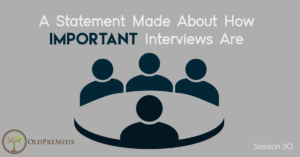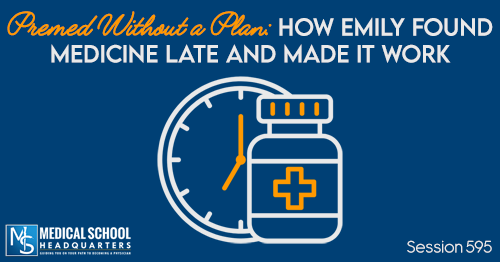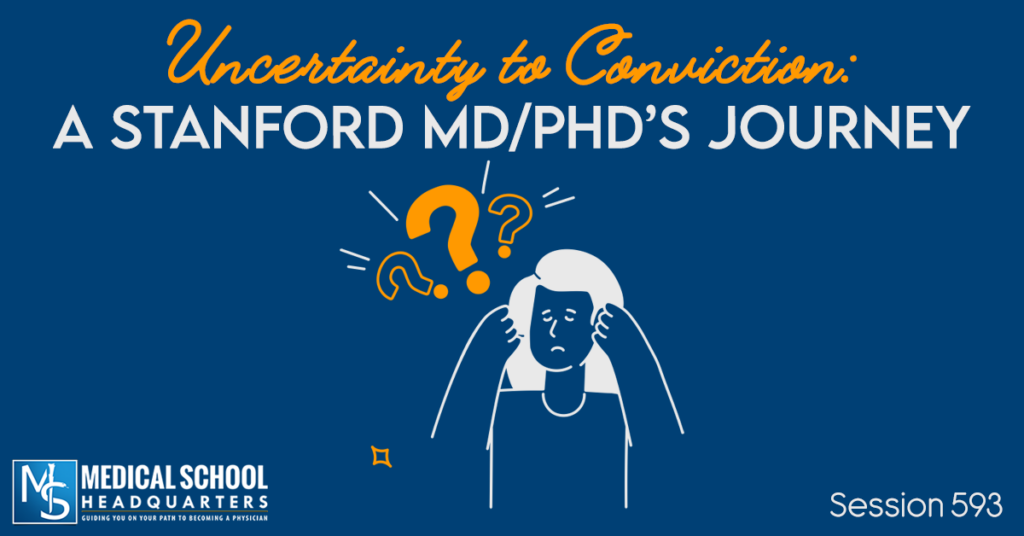Session 30
Your questions, answered here on the OldPreMeds Podcast. Ryan again dives into the forums over at OldPreMeds.org where they pull a question and deliver the answers right on to you.
Today, the questions revolves around the interview process and the feedback they received from a physician about the interview process.
OldPreMeds Question of the Week:
Poster had a talk with a neurosurgery resident and gave so much insight into the journey, highlighting the fact that entry to medical school is not a destination. He is in the last year of residency as a chief resident after 18 years of education and residency. Poster shares the resident’s insights and the deal breaker is the actual interview where only personality matters subject to the interviewer. Poster wants to ask any other insights into the interview.
Here are the insights from Ryan:
There are no such things as GPA and MCAT cutoffs.
If you got an interview at a medical school, they’ve taken the leap of faith that your scores are competitive enough to be a student at that school.
Once you have your interview and matched up among everybody else that had an interview, your GPA and MCAT still might fall short. If you have a perfect interview against another perfect interview of a student and everything else is equal but the other student has a higher MCAT score or GPA, they might get the spot over you.
Go into the interview thinking that the acceptance is yours to lose. You have to be there prepared and ready to go.
Over the years, schools have been refining what they use to select students. The AAMC has the core competencies that medical schools look at. Then the medical schools look at your applications, secondaries, interview skills and comparing you to a core competency list which takes some subjectivity out of it.
Ryan is releasing an interview book soon on Amazon as well as its print version. Go to www.medschoolinterviewbook.com to sign up and be notified when the book releases or if it’s already out.
Major takeaway from this episode:
Personality is not the only thing that matters and that it is subject to the interview. Personality matters in everything in life and you need to be prepared for that interview.
Links and Other Resources:
www.medschoolinterviewbook.com
Transcript
Introduction
Dr. Ryan Gray: The Old Premeds Podcast, session number 30.
You’re a nontraditional student entering the medical field on your terms. You may have had some hiccups along the way, or you’re changing careers, now ready to go back, change course, and serve others as a physician. This podcast is here to help answer your questions and help educate you on your journey to becoming a physician.
Welcome to the Old Premeds Podcast where we take questions directly from the Old Premeds forums over at www.OldPremeds.org. Again that’s www.OldPremeds.org. If you do not have an account over there, I highly suggest you go over there and get one right now. Unlike the other three letter forum out there, the Old Premeds forum is very nice, very gentle, and very helpful. This question today revolves around the interview, and it’s interesting, it’s not so much a question as more of a statement that this poster made about the interview process, and their feedback that they received from a physician, a neurosurgery resident about the interview process. And so I’ll go ahead and read this here.
Statement Regarding Interviews
It said, ‘I had a great talk with a “brain surgeon.” He gave so much insight into this journey, and definitely highlights the fact that entry into medical school is not a destination. He is in his last year of residency as a chief resident after eighteen years of education and residency, and the whole journey. Good for him and our medical training requirements. One thing I wanted to share is his insight into interview. Apparently after meeting the GPA and MCAT cut-off, becoming a medical school student, the big deal breaker is the actual interview where only personality matters, but subject to the interviewer. This was much motivation for me. I know there may be threads already out there, but I didn’t find specifics since it is fresh info and on my mind, thought I should post and ask. Any other insights on the interview?’
Alright so I wanted to just highlight a couple of things that this poster mentioned and clarify some things. So they talked about after meeting GPA and MCAT cut-offs, there really are no such thing as GPA and MCAT cut-offs. If you got an interview at a medical school, they obviously have taken the leap of faith that your grades and your MCAT score are competitive enough to be a student at that school. Now once you have your interview, and you are matched up among everybody else that had an interview, your GPA and MCAT still might fall short, and that’s just the nature of the game. Once they interview everybody that they want to interview, and they take notes and rank all their interviews, and if you have a perfect interview against another perfect interview student, and everything else is equal but that other student has a higher MCAT score or higher GPA, they might get the spot over you. So there really is no such thing as a GPA and MCAT cut-off.
What you said next- what the original poster said next was the big deal breaker is the actual interview, and yes, I would probably agree with that. If you got an interview, you have to go into the interview thinking that the interview is yours to lose- or the acceptance is yours to lose actually. And so it is a big deal breaker. You need to go in there prepared and ready to go.
Personalities and the Interview
But the next statement here, it says, ‘where only personality matters but subject to the interviewer.’ Personal bias and subjectivity have been in the past an issue with medical school interviews, and interviewers, and schools know this and over the years they have been refining what they use to select students. The AAMC has the core competencies that medical schools look at and are comparing and looking at your applications, your secondaries, your interview skills, the questions they ask, and comparing you to a core competency list which takes some subjectivity out of it. There is the holistic review process that the AAMC has been working on, which takes some subjectivity out of it. So I wouldn’t say that only personality matters and that it’s subject to the interview. I think obviously personality matters in everything in life, and you need to be prepared for the interview.
Final Thoughts
Now I’ve been working a lot on the interview process recently, not only doing mock interviews with students, but also writing an interview book that was recently picked up by a publisher and will be out- as I’m recording this soon, likely on Amazon for a little bit, and then eventually as a print version hopefully in book stores near you and also on obviously Amazon and Kindle and everywhere else.
So if you are interested in learning more about the interview process, go to www.MedSchoolInterviewBook.com and you can sign up to be notified when the book releases, or if it’s already out it will take you to where you can purchase it. Again www.MedSchoolInterviewBook.com.
Again this question taken, and more of a statement this time, taken directly from the Old Premeds forums over at www.OldPremeds.org. If you have a question you would like to ask and have answered here, go ahead and sign up for an account, again over at www.OldPremeds.org. List your question and I’ll get to it when I can.
I hope you got a ton of great information out of this episode, and I hope you join us next week here at the Medical School Headquarters and the Old Premeds Podcast.







